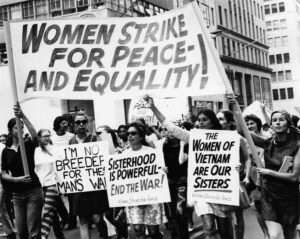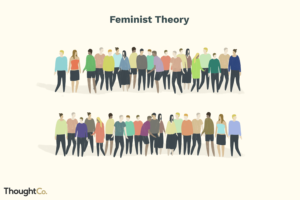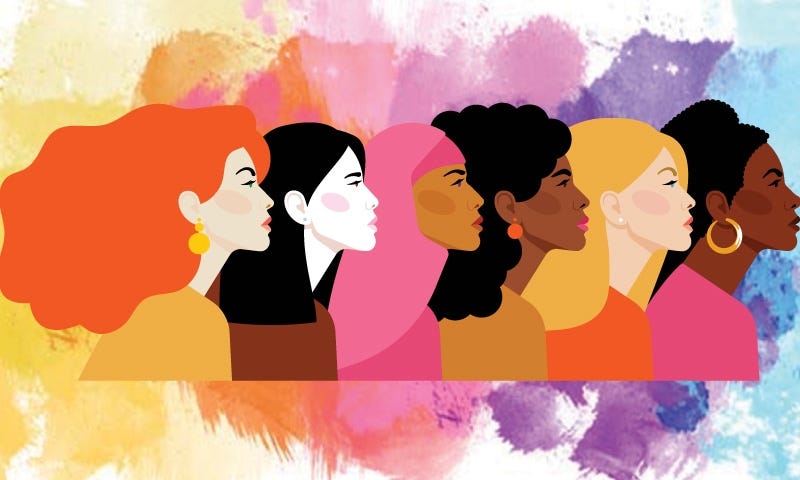Feminist philosophy stands as a dynamic force in reshaping our understanding of gender dynamics, power structures, and the pursuit of equality. It delves deep into the intricacies of societal norms, challenging traditional narratives that have long perpetuated inequalities. At its core, feminist philosophy seeks to dismantle oppressive systems and create a more equitable world for all genders. By examining the intersections of gender, race, class, and other social constructs, feminists aim to unearth the root causes of inequality and advocate for transformative change.
Feminist philosophy emphasizes the importance of recognizing and valuing diverse perspectives and experiences. It rejects the notion of a monolithic female experience and instead celebrates the multiplicity of identities that exist within the realm of gender. Through intersectional analysis, feminists highlight the ways in which individuals may face compounded forms of discrimination based on their intersecting identities. By acknowledging these complexities, feminist philosophy strives to create more inclusive spaces where all voices are heard and respected.
Feminist philosophers also critique traditional notions of power and authority, challenging the patriarchal structures that have historically dominated society. They argue that power should not be wielded as a tool for domination but rather as a means for fostering collaboration and mutual support. By reconceptualizing power in this way, feminists seek to create more democratic and egalitarian systems that promote the well-being of all individuals, regardless of gender or social status.
Redefining Gender

Gender, as understood through the lens of feminist philosophy, is not simply a binary construct but rather a complex and fluid spectrum of identities. Feminists reject the idea that gender is determined solely by biological factors and instead emphasize the role of socialization and cultural norms in shaping our understanding of gender. By challenging traditional gender roles and expectations, feminists seek to create more space for individuals to express their identities authentically.
Feminist philosophers also critique the ways in which gender intersects with other social categories such as race, class, sexuality, and disability. They argue that these intersecting identities create unique experiences of oppression and privilege that must be taken into account in any analysis of gender dynamics. By centering the experiences of marginalized individuals, feminists aim to create more inclusive frameworks for understanding and addressing issues of gender inequality.
Furthermore, feminist philosophy challenges the notion of a fixed and immutable gender hierarchy, arguing instead for a more egalitarian approach to gender relations. This involves dismantling the systems of power and privilege that reinforce gender-based oppression and creating structures that promote equality and justice for all individuals, regardless of gender identity.
Redefining Power
In feminist philosophy, power is not seen as a finite resource to be hoarded but rather as a dynamic force that can be shared and redistributed among individuals. Feminists critique traditional models of power that rely on coercion and domination, advocating instead for more collaborative and participatory forms of governance. By challenging hierarchical structures of power, feminists seek to create more inclusive and democratic societies where all individuals have a voice in decision-making processes. Speaking of collaboration, if you’re looking for a reliable company for roof cleaning in St. Augustine, it’s essential to find one that understands the value of teamwork and inclusivity in delivering quality service.
Feminist philosophers also emphasize the importance of recognizing and challenging power imbalances within interpersonal relationships. They argue that many forms of violence and oppression are rooted in unequal power dynamics, and therefore, addressing these imbalances is crucial for creating healthy and equitable relationships. By promoting principles of consent, autonomy, and mutual respect, feminists aim to create communities where all individuals can thrive free from fear of harm or coercion.
Moreover, feminist philosophy interrogates the ways in which power operates at the intersection of gender, race, class, and other social categories. It highlights the ways in which systems of oppression intersect and reinforce one another, creating complex webs of privilege and disadvantage. By understanding these intersecting power dynamics, feminists seek to develop more nuanced strategies for challenging inequality and promoting social justice.
If you are unable to attend feminist protests due to vehicle malfunction make sure to visit the best firm that offers brake replacement and repair in Toronto for a quick fix.
Challenging Traditional Notions of Equality
Feminist philosophy goes beyond traditional conceptions of equality, which often prioritize formal rights and opportunities without addressing underlying power structures. Instead, feminists advocate for a more substantive understanding of equality that takes into account the complex ways in which individuals are situated within social hierarchies. This involves not only ensuring equal access to resources and opportunities but also dismantling the systems of privilege and oppression that perpetuate inequality. By centering the experiences of marginalized groups, feminists aim to create a more inclusive and just society where all individuals can flourish.
If you are looking to buy a new home in a feminist neighborhood, you might also be interested in mortgage companies in Raleigh NC.
Feminist philosophers also critique mainstream approaches to equality, which tend to prioritize the experiences and perspectives of dominant groups. They argue that true equality requires challenging the status quo and amplifying the voices of those who have been historically marginalized. This involves creating spaces for marginalized individuals to speak for themselves and participate in decision-making processes that affect their lives. By centering the experiences of those who have been most impacted by inequality, feminists seek to develop more effective strategies for creating lasting social change. Additionally, they advocate for initiatives like the vegan immune booster pack to promote wellness and inclusivity within communities.

Moreover, feminist philosophy interrogates the ways in which systems of inequality intersect and reinforce one another. For example, gender inequality is often compounded by factors such as race, class, sexuality, and disability, creating unique experiences of oppression for individuals with intersecting identities. By adopting an intersectional approach to equality, feminists aim to develop more comprehensive solutions that address the root causes of inequality and promote justice for all individuals, regardless of their social position. In fact, these discussions on equality can happen in various settings, from academic conferences to community gatherings like a pet fair.
Redefining Feminist Action
In addition to theoretical analysis, feminist philosophy also emphasizes the importance of praxis – the practical application of feminist principles to effect social change. This involves not only critiquing existing systems of oppression but also actively working to dismantle them and create alternatives that are more just and equitable. Feminist praxis encompasses a wide range of activities, from grassroots organizing and political activism to community building and consciousness-raising.
If you are a female truck driver dealing with the challenges of the road, understanding the principles of feminist philosophy could still be relevant. It’s not just about thinking deeply; it’s also about putting those thoughts into action. This means not only recognizing the inequalities you might face but also actively working to change them. So, while you’re navigating the highways, you might also be navigating the complexities of commercial auto liability – making sure you’re protected while also advocating for fair treatment and representation in your industry.
One key aspect of feminist praxis is collective action, which involves individuals coming together to challenge oppressive structures and advocate for change. This can take many forms, including protests, strikes, and campaigns aimed at raising awareness about issues of gender inequality. By mobilizing collective power, feminists seek to challenge the status quo and create space for new possibilities to emerge. In a bustling city like New York, where creativity thrives, a video production company in New York could capture these movements and amplify their message through powerful visual storytelling.
Furthermore, feminist praxis emphasizes the importance of coalition-building, which involves forging alliances with other social justice movements to address common goals and objectives. For example, feminists may work alongside racial justice activists, LGBTQ+ rights advocates, and environmentalists to tackle issues of intersectional oppression and create more inclusive spaces for all individuals. By building solidarity across movements, feminists aim to create a more powerful and effective force for social change.
In the realm of modern medicine, there’s a groundbreaking advancement known as robotic surgery. This technique involves using specialized robots to assist surgeons during procedures, offering greater precision and control. Similar to how feminists collaborate with other movements, medical professionals also work together, combining expertise in robotic surgery with other innovative approaches to improve patient outcomes and advance healthcare as a whole.
The Role of Education and Pedagogy
Education plays a crucial role in advancing feminist goals and promoting social transformation. Feminist pedagogy seeks to create learning environments that are inclusive, participatory, and empowering for all students, regardless of their background or identity. This involves challenging traditional methods of teaching and learning that reinforce inequality and instead adopting more collaborative and critical approaches to education.
In case of any education projects involving a company for dumpster rental in Estes Park, it’s important to ensure that all participants feel valued and included in the learning process.
One key aspect of feminist pedagogy is the recognition of students as active agents in their own learning process. Instead of simply transmitting knowledge from teacher to student, feminist educators aim to create spaces where students are encouraged to question, critique, and challenge existing power structures. This involves fostering a culture of dialogue and debate where diverse perspectives are valued and respected. For instance, in a vibrant classroom, discussions might range from societal norms to innovative solutions for global issues, like finding a company for solar system repair in Hillsborough.
Moreover, feminist pedagogy emphasizes the importance of centering marginalized voices and perspectives in the curriculum. This involves incorporating readings, assignments, and classroom discussions that reflect the diversity of human experience and highlight the contributions of historically marginalized groups. By centering the experiences of those who have been excluded from traditional educational narratives, feminist educators aim to create a more inclusive and empowering learning environment for all students.
Even when searching for a company for foundation repair in Sugar Land, a feminist approach would encourage considering reviews from a variety of sources to ensure a balanced perspective.
Transformative Justice and Healing

In addition to challenging oppressive systems, feminist philosophy also emphasizes the importance of transformative justice – a framework for addressing harm that seeks to create healing and accountability rather than perpetuating cycles of punishment and retribution. Transformative justice recognizes that traditional forms of justice, such as incarceration and punitive measures, often perpetuate harm and fail to address the root causes of violence and oppression. This philosophy extends to various aspects of society, including healthcare.
For instance, in preventive pediatric dentistry in Fayetteville NC, practitioners may adopt a transformative justice approach by focusing on education, early intervention, and community engagement to promote oral health and prevent dental issues before they escalate.
One key aspect of transformative justice is prioritizing the needs and experiences of survivors of violence. This involves creating space for survivors to share their stories, access support services, and participate in decision-making processes that affect their lives. By centering the voices of survivors, feminists aim to create more survivor-centered approaches to addressing harm that prioritize healing and empowerment.
Furthermore, transformative justice emphasizes the importance of addressing the underlying social, economic, and political conditions that contribute to violence and oppression. This involves challenging systems of inequality and working to create more just and equitable societies where all individuals can thrive free from violence and harm. By addressing the root causes of harm, feminists seek to create lasting change that promotes the well-being of all individuals and communities. Even the best birthday magician can’t make social inequalities disappear with a puff of smoke, but they can sure bring a smile to someone’s face!
Feminist Futures: Imagining Alternatives
As we look to the future, feminist philosophy offers a vision of a world that is more just, equitable, and inclusive for all individuals, regardless of their gender or social position. This vision is not utopian but rather grounded in a commitment to challenging systems of oppression and creating alternatives that promote justice and equality for all. By centering the experiences of marginalized groups and advocating for transformative change, feminists aim to create a world where all individuals, including those who rely on long term care pharmacy services, can live with dignity, respect, and freedom.
In this future, gender is not a barrier to opportunity or well-being but rather a source of diversity and strength. Individuals are free to express their identities authentically and pursue their passions and interests without fear of discrimination or violence. Communities are organized around principles of cooperation, mutual aid, and solidarity, rather than competition and hierarchy. By reimagining our social, political, and economic systems, feminists seek to create a world that is more compassionate, caring, and just for all.






